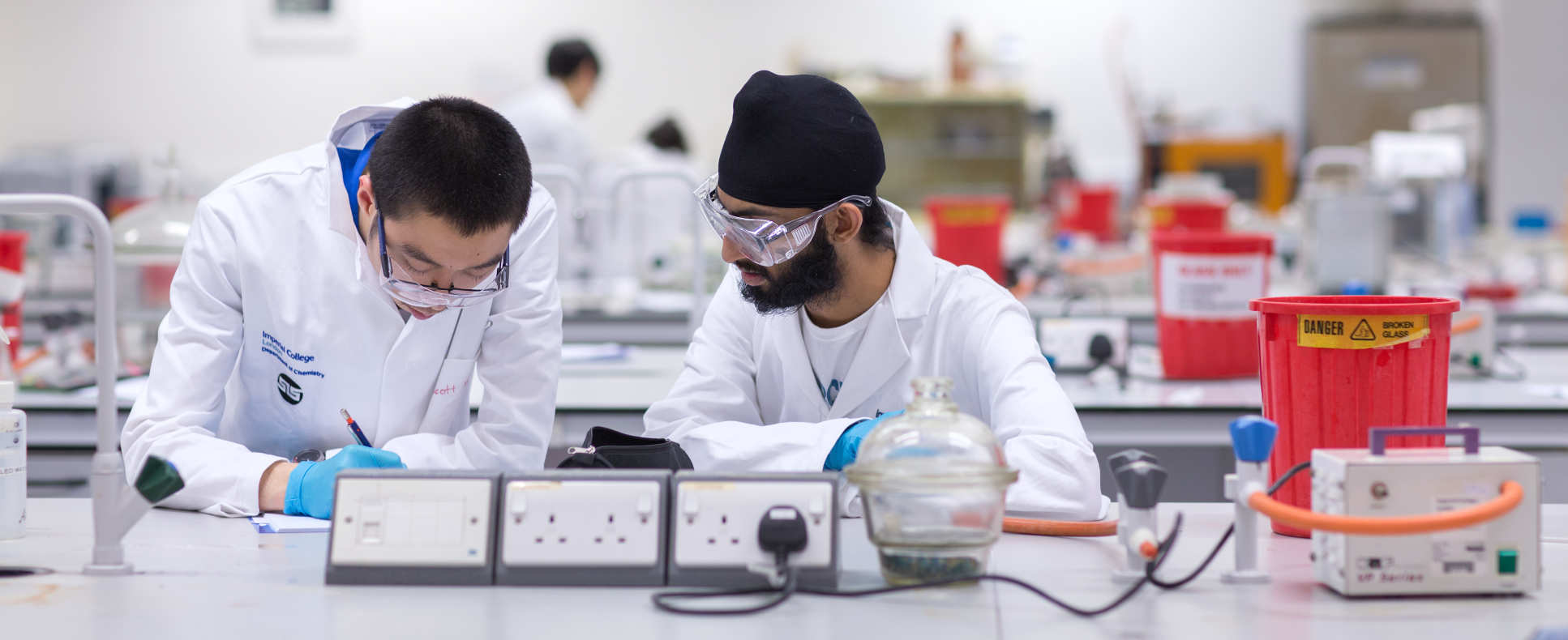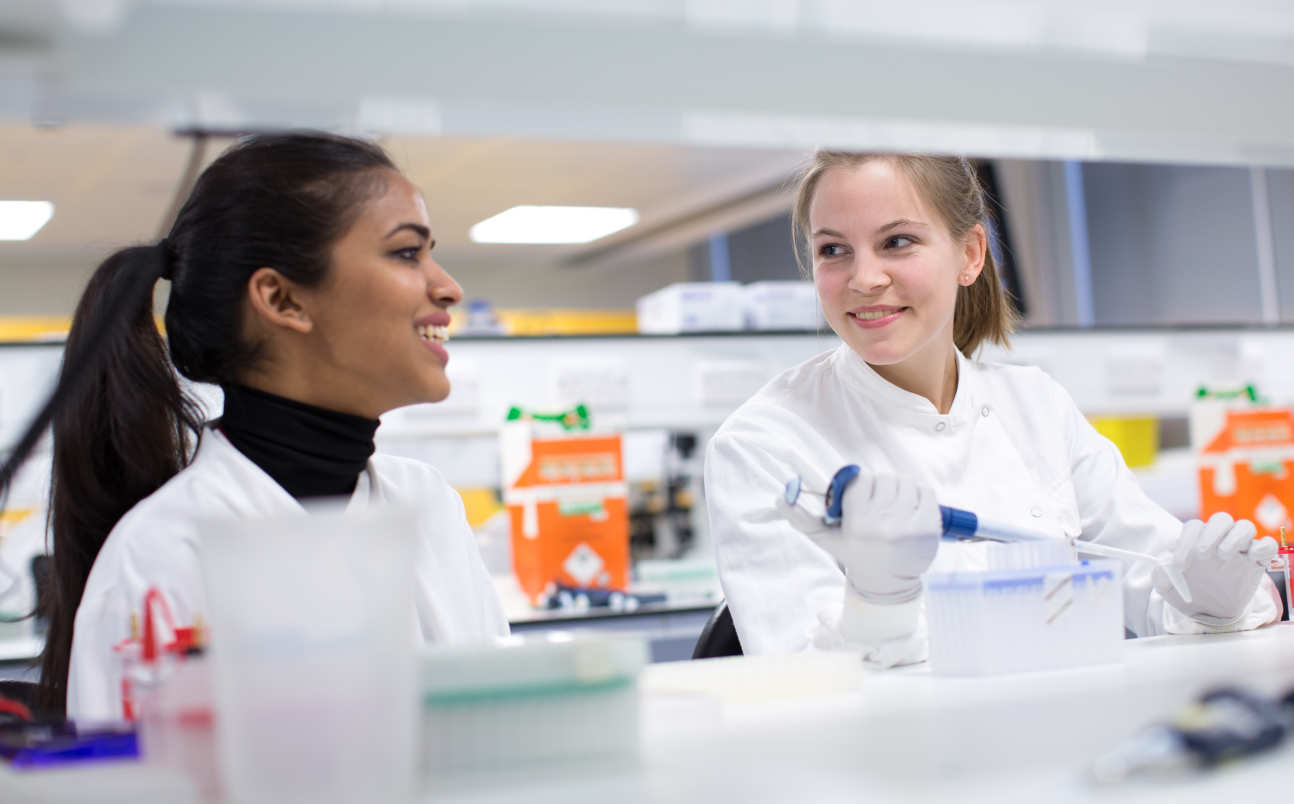
Teaching at university will not be as structured as you are used to, but through a combination of lectures, tutorials, group work, practical classes and lab work (depending on your subject), there will be plenty of different ways to learn. Learning outcomes or objectives are provided for each module (and often for each lecture) so you should be able to keep track of your own progress.
We've compiled a list of the main types of teaching you are likely to encounter during your degree.
Tabbed information block
Lectures will be an important way for you to learn at university. Staff use lectures to explain core subject material, providing an introduction to key concepts, theories, research and literature relating to your chosen subject. Lectures are often delivered to large groups of students, with some lecture theatres holding up to 300 students.
All lecturers have different styles - some will work through presentations (often using Powerpoint) that have been prepared and provided in advance, some will spend a lot of time writing on a board or using a projector to illustrate theories or problems, and some will mostly talk and use demonstrations. How your lecturer presents the information will influence how you capture it, and how you learn, so flexibility is important.
Interactive teaching
Many lecturers use an interactive style of teaching. For example, they will often ask students to answer questions during lectures, sometimes using interactive tools like Mentimeter, or by asking you to discuss your answers in pairs or smaller groups. You might also be provided with material to read or watch before the session. This might include watching a video, listening to podcasts or completing an e-learning module. Class time is then used for discussion and group work, where all members of the group are encouraged to participate.
Don’t worry if you encounter different styles of teaching in lectures, or if they aren’t what you expect. The diversity of delivery can reflect both the subject material and your lecturer’s individual style – this will give you the chance to learn in the way best suited to the material.
Learning resources
Often, resources to support the lecture – including slides or handouts – will be provided online through Blackboard, the College’s Virtual Learning Environment. You can also watch lecture recordings on Panopto; this means you don’t need to spend time trying to write down everything your lecturer says, giving you more freedom to engage with the subject matter and focus on the key concepts and questions. The university’s audio and video lecture recording guidelines are available on the Panopto webpage, including the rules on sharing of recorded materials.
Teaching in tutorials is usually less structured than a lecture, and the content of the sessions are often led by the students more than the tutor. Tutorials usually involve learning in small groups and they allow you to explore topics in more detail, and to discuss, question and challenge the subject with your tutor and your peers. It is really important for you to participate in tutorials in order to develop your thoughts and ideas, and enhance your learning experience.
Typically tutorials:
- Encourage active learning and feedback;
- Improve self-expression;
- Allow time for some ‘hands on’ practice.
Try to ask questions, even if you think everyone else knows the answer, you may find that other students have similar concerns and questions, and you can use your tutorials to share and compare ideas. Tutorials are also a good opportunity to discuss and express your ideas as they will help you develop confidence with public speaking, presenting and using the ‘language’ of the discipline.
Tutorials work best when everyone in the group contributes. You may be asked to prepare work in advance, or to read about a lecture topic and discuss it. Find out more about effective team work and asking questions.
Practicals are more about learning than teaching - they give you an opportunity to apply the information you have learned and discussed in lectures and tutorials. Labs are very hands on, so there are plenty of opportunities to ask questions and get support when you need it.
Depending on your subject, practical work may be lab-based, computer-based, or may involve clinical practice or fieldwork. No matter what the ‘lab’ is called, they all involve learning important practical skills which will take time to master, so don’t miss out on the opportunity to develop these skills. For most students, applying new knowledge in a practical setting forms a key part of the learning process.
Staff will be available to provide relevant advice about the environment you’ll be working in, as well as the practical skills you’ll be expected to master during your degree. This might include laboratory tutors, demonstrators, technicians and Graduate Teaching Assistants.
Some practical skills may be directly assessed, but in most laboratory classes you will have to conduct a series of tasks and generate results which you will need to capture, along with your own notes, in a lab book. These results will be checked before you leave the lab. If things don’t go to plan, or if your results are not as expected, you should seek advice so you can understand where things might have gone wrong. You will also need to be able to discuss any errors that could arise whilst using specific methods.
Following a lab-based class you may need to write a lab report, these are frequently assesed and will require you to use and understand the results and notes you made in your lab book.
As always, teaching staff are there to support your learning, and you should take advantage of their expertise to help develop your understand and expand your knowledge.
Labs allowed me to implement the knowledge I gleaned from lectures and provided a friendly, supportive environment to discuss the subject with my course-mates. Never be worried to ask your peers or demonstrators a question during labs, the discussion it provokes is often more insightful than any textbook! For me, lab work was the most enjoyable part of my degree."
Nas Andriopoulos
Imperial College Union President 2016-17
Depending on your subject, your course might include practical learning through fieldwork. This provides a great opportunity to apply the knowledge you have gained in class to the real world. Students are supported by academic members of staff, researchers and Graduate Teaching Assistants while you’re away.
Depending on your subject, you might be taught in a problem class, where students work through mathematical or other questions in a class environment. This will provide an opportunity to get help with your work and to ask questions if you get stuck. Problem classes might be lead by an academic member of staff, a researcher or a Graduate Teaching Assistant.
If your course includes a placement, this will give you the chance to spend some time away from university; this will count towards your degree. Placements vary in length and might be optional or compulsory, depending on your course.
For many, this is a Year Abroad (a year of study at another university) or a Year in Industry, while in some departments it is a shorter study period abroad or a shorter industrial placement or project. In Medicine, clinical attachments and final year electives are placements.
During an industrial placement you should be given projects to complete which are relevant to your course, where you can apply your knowledge and develop your skills in solving real world problems. Placements are supervised by members of staff from the company you will be working for, as well as a member of staff from your Department.
If a Year in Industry or shorter forms of industrial placement are of interest to you, then the Careers Service Internships & placements pages are a great starting point for further information, and the Careers Service can provide support with searching and applying for opportunities.
More information for students regarding placements is available on the University Registry's Placements pages.
Next Page
What to do before you arrive